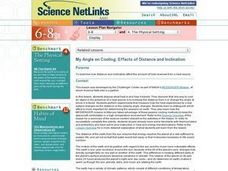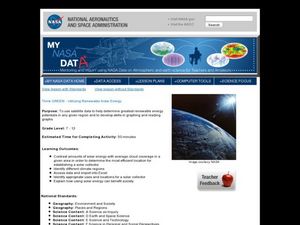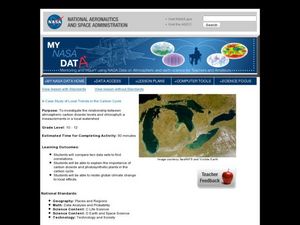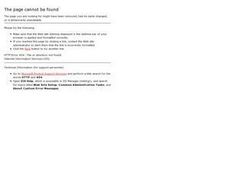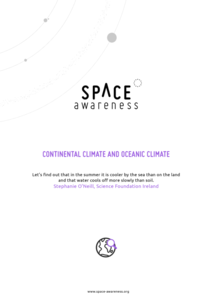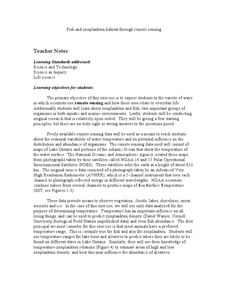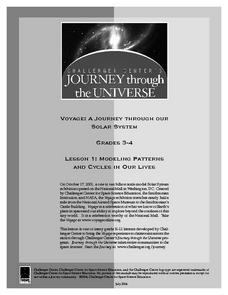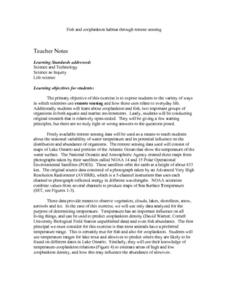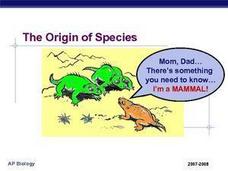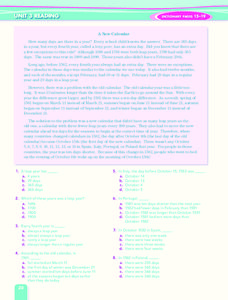Curated OER
The Solstices
Compare surface temperatures when the solstice occurs in the different hemispheres. Young scientists draw conclusions from their investigation of data collected using spreadsheets and a globe.
Curated OER
Writing in Note Form
Taking notes is the topic today. Kids learn why notes are taken, when they are useful, and how to pick out the most important information to make their notes functional. Several interesting examples of various note forms are shown, along...
American Museum of Natural History
What do you Know About Climate Change?
Test the class's knowledge of the key components of climate change. A 10-question online quiz asks learners about weather, climate, greenhouse gases, and several other concepts related to climate change. Interactive and easy for...
Curated OER
My Angle on Cooling: Effects of Distance and Inclination
Students discuss what heat is and how it travels. They discover that one way to cool an object in the presence of a heat source is to increase the distance from it or change the angle at which it is faced.
Curated OER
Winter Holiday Celebrations
Students understand how holidays revolve all around light. In this winter holidays lesson, students find the similarities and differences between the winter holidays. Students discuss the winter solstice and how it relates to the holiday...
Curated OER
Two Rivers Ran Through It
Sixth graders discover the problems that early Mesototamian farmers faced while developing agriculture in the land between the Tigris and Euphrates Rivers. They design a working model that solves those unique challenges.
Curated OER
Differences Between Ground and Air Temperatures
Students examine the differences between air temperature and ground temperature. In this investigative lesson students find NASA data on the Internet and use it to create a graph.
Curated OER
Think GREEN - Utilizing Renewable Solar Energy
Students use data to find the best renewable energy potential. In this solar energy instructional activity students import data into Excel and explain how solar energy is beneficial.
Curated OER
Case Study of Local Trends in the Carbon Cycle
Students examine the relationship between chlorophyll and carbon dioxide in the atmosphere. In this investigative lesson students study the local effects of climate change.
Curated OER
Find the Main Idea: O Pioneers! by Willa Cather
An excerpt from Willa Cather's O Pioneer's! provides learners with practice in finding the main idea and supporting details in a narrative. As readers record the bleak details on the included graphic organizer, they can conclude that...
Curated OER
Hawk in Flight
Students use information gathered by satellites to explore the migration of the Swainson's hawk from the western border of Minnesota to the southern portion of South America.
Space Awareness
Continental Climate and Oceanic Climate
There's nothing better than a cool breeze blowing in from the ocean. Scholars explore how water affects change in temperature using a hands-on experiment on climate. They use measurement tools to compare the continental and oceanic...
Curated OER
Fish and Zooplankton Through Remote Sensing
Ecology aces examine sea surface temperature maps and relate temperatures to concentration in fish and zooplankton populations. Take your class to a computer lab and provide experience with actual remote sensing data. Some of the links...
Curated OER
Modeling Patterns and Cycles in Our Lives
Students explore how building a model can help them better understand the natural world. They identify common cycles or patterns in nature as well as examples of models in the classroom. After discussion, they choose a pattern or cycle...
Curated OER
Fish and zooplankton habitat through remote sensing
Young scholars are exposed to the variety of ways in which scientist use remote sensing and it used in everyday life. They investigate about zooplankton and fish. Students list the two important groups of organisms in both aquatic and...
Curated OER
Barrels and Buckets: Access to Water - What Would It Be Like to Live in Africa?
Young scholars compare water access in the United States with that of Africa. For this water access lesson, students located Ghana and Kenya on a globe before reading Peace Corps Volunteer accounts of the difficulty of accessing clean...
Curated OER
Origin of The Species
After viewing information about different types of isolation, students will see that reproduction among a group will cause the frequency of a specific trait to increase. The history of prominent scientists such as Charles Darwin are and...
Colorado Unit Writing Project
Fun with Phonemic Awareness
The phonemic awareness activities in this packet are designed to help kids develop skills in rhyming, syllabication, blending onsets and rimes, and beginning and ending sounds. Well worth a place in your curriculum library.
Pearson Longman
A New Calendar
The year 1582 was a very strange year. That year there was no October 5, 6, 7, 8, 9, 10, 11, 12, 13, or 14. Kids find out why when they read this short comprehension worksheet with a passage about the new calendar instituted in 1582.
NOAA
Ocean Layers II
Now that you know the ocean has layers, let's name them. The seventh installment of a 23-part NOAA Enrichment in Marine sciences and Oceanography (NEMO) program covers terminology associated with ocean layers, such as thermocline and...
National External Diploma Program Council
Capitalization Review
Using correct grammar is a capital idea! Elementary readers review the rules of capitalization, including proper nouns, abbreviations of organizations, and holidays, before correcting the errors in two sets of sentences.
Messenger Education
Give Me a Boost—How Gravity Assists Aid Space Exploration
The propellant needed for space explorations runs in the thousands, while paying to get the craft into orbit costs millions! In the second installment of three, two activities explore laws of conservation of energy and momentum. Using...
Cornell Lab of Ornithology
Life In A Nest: Exploring Life Cycles With Bird Cams
Why read about it when you can watch it happen? Bird cams make it possible for learners to experience the life cycle of a bird in real time! An engaging set of lessons provides activities to connect their learning to bird cam...
International Technology Education Association
Reinventing Time
Take a trip through time. A lesson resource provides instruction on the origin of current measurements for time. The text explains the different tools humans used throughout history to measure time as well as provides examples such as...
Other popular searches
- Planet Earth Seasons
- Seasons and Earth Movement
- What Causes Earth Seasons
- Tilt of Earth Seasons
- Earth Seasons and Tilt
- Earth Seasons and Moon
- Earth Seasons Vocabulary
- Earth Seasons Axis
- Earth Seasons Projects
- Earth Rotation Seasons Time
- Seasons on Earth
- Seasons Earth





